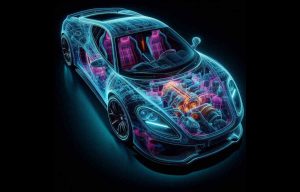Car electronics comprise everything that helps your vehicle run, whether the engine or the entertainment system. Dash cameras, GPS and navigation units, backup camera systems, radar detectors, and power inverters are car electronics you can use daily.
Think about adding a stereo amplifier or subwoofer if you want to improve your vehicle’s audio system. Bluetooth-enabled devices give you the option of hands-free control and easier pairing with other devices. You can also purchase custom equipment, such as remote start and security systems, that integrate with your vehicle’s original components.
Car electronics comprise everything that helps your vehicle run, whether the engine or the entertainment system.
When you think about car electronics, you’re probably picturing the stereo, speakers, and other audio equipment. These are all part of the entertainment system category in your vehicle. If a car is equipped with an engine control unit (ECU) and electronic throttle control (ETC), it also has some engine management system.
But what about fuel injection? What about exhaust pipes? Those are part of the engine category—and they’re equally important!
The fuel system includes everything that brings in fuel from outside sources: filter(s), pump(s), injectors, and more. The exhaust system is responsible for getting hot gases out of the engine compartment, including headers and mufflers, if your car has them installed. It also encompasses catalytic converters (which help reduce air pollution) when applicable to non-diesel engines such as gas-powered ones.
Dash cameras, GPS and navigation units, backup camera systems, radar detectors, and power inverters are car electronics you can use daily.
Dash cameras are a great way to record your drive in case of an accident or other incident. In addition to being helpful in the event of an accident, dash cameras can also be used for insurance purposes and monitoring drivers around you.
Drivers use GPS units to find their location on a map and provide directions for getting there. Some GPS units also work with navigation apps such as Google Maps to help drivers get from point A to point B without getting lost!
Radar detectors alert motorists about any police radar activity in the vicinity. They’re typically installed under dashboards or mounted onto windshields to detect signals from nearby radars (like those used by local police departments). If you have one of these systems installed in your car, it will alert you when those radars are detected so you can avoid them!
Power inverters allow users to run electronics directly off their vehicle’s battery. At the same time, they’re parked at home or work — instead of having another electrical outlet installed near where these electronics would typically be placed (such as inside a garage). This is especially useful if someone lives in an apartment building without any outlets nearby!
Think about adding a stereo amplifier or subwoofer if you want to improve your vehicle’s audio system.
Knowing what you need is essential when you’re thinking about adding a stereo amplifier to your vehicle. If the audio system in your car is already functional and has impressive sound quality, then an amplifier may be unnecessary.
However, if your audio system doesn’t have enough power or volume for the installed speakers, it might be time to invest in one.
A good stereo amplifier will enhance your music’s quality and increase its volume without distorting it too much. It will also allow for multiple channels so multiple speakers can play at once without causing any interference or feedback issues with each other (which would make them sound bad).
If you want to use this device with subwoofers (speakers designed specifically for bass), then opt for one with plenty of RCA inputs on both sides so they can easily connect with other devices, such as turntables or CD players through their output ports; these may vary from model-to-model but usually provide an easy way for connecting external devices directly to the base unit itself.
Bluetooth-enabled devices give you the option of hands-free control and easier pairing with other devices.
Bluetooth-enabled devices give you the option of hands-free control and easier pairing with other devices.
Bluetooth technology enables you to perform various functions such as making and receiving calls, listening to music, getting directions, and more without the need to touch your phone when it comes to music physically. It’s a wireless technology that works through radio frequency (RF).
You can also purchase custom equipment, such as remote start and security systems, that integrate with your vehicle’s original components.
You can also purchase custom equipment, such as remote start and security systems, that integrate with your vehicle’s original components. Remote start systems enable you to start your car afar, which is particularly useful during harsh weather conditions such as winter or rain. Security systems are used to track your vehicle if it is stolen. Still, they can also be enabled remotely to notify you of a break-in or other unauthorized entry into your vehicle. These are both examples of custom car electronics.
Regarding car electronics, consider how you want to use your devices before purchasing.
The best way to ensure you get the right car electronics is to consider how you want to use your devices before purchasing. This includes:
- How much time do you spend in your car?
- What features do you want in your vehicle?
- What are you willing to spend on car electronics?
- What size of vehicle are they going into (i.e., larger vehicles like SUVs and trucks may require larger screens, while smaller ones will require more discreet models)?
Conclusion
There are so many car electronics to choose from that it can be overwhelming. The best way to narrow down your options is by selecting the ones that will help you most with your daily driving habits or passions. Think about what features you need, and then go from there! Check out our website also.




